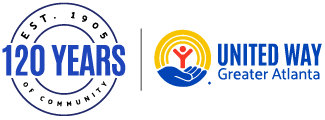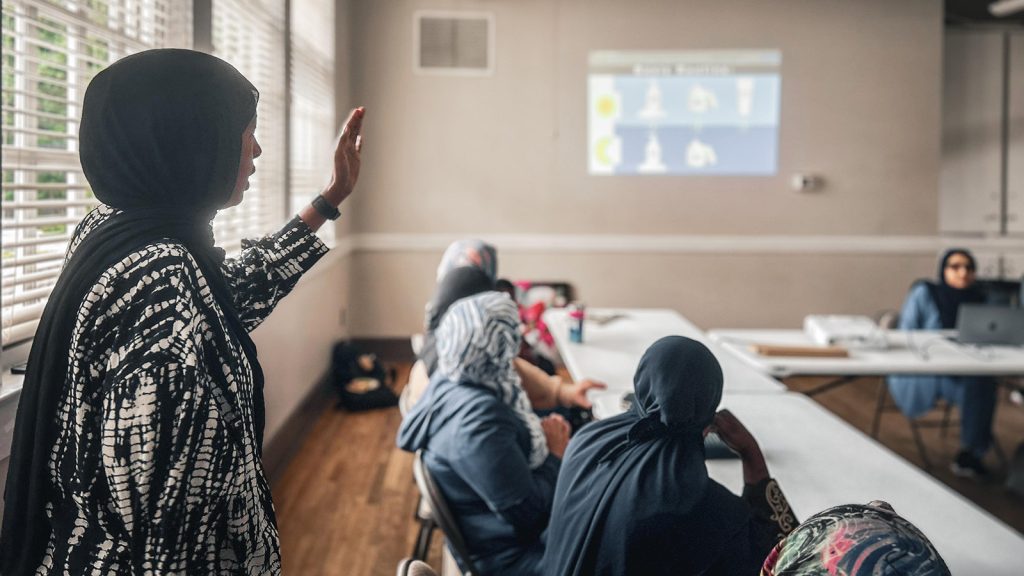Scheduling preventative care appointments, filing medical insurance paperwork, getting a vaccine—these are tasks many of us tend to put off because they seem like a hassle. Now imagine facing these same tasks in a new country, while also raising a family and learning a new language and new systems from scratch. What’s a chore for those of us who grew up with the U.S. healthcare system becomes a major obstacle for those who didn’t.
For the last decade, United Way of Greater Atlanta has partnered with neighborhood organizations to hire Community Health Workers to help bridge these barriers to healthcare. In Clarkston—often called the most diverse square mile in America due to its large international population—our partner Refugee Women’s Network leads the way, employing women from within the refugee and immigrant communities that they serve.
“They are frontline health workers, and are viewed as trusted community members,” said Ebony Johnson, Senior Director for Brighter Futures at United Way. “What makes that work so special is that they can reach the community in ways that health practitioners can’t, because they are for the community, by the community and supported by the community.”
In neighborhoods like Clarkston with lower access to resources—identified though our Child Well-Being Index®—access to healthcare goes beyond just individual wellness. Fewer sick days means more days in school for children to achieve academically, and more days at work for parents to support a family’s financial stability. The health of individuals is deeply interconnected with the health of a community as a whole. By investing in trusted Community Health Workers, we’re bringing healthcare within reach for families, and uplifting neighborhoods in the process.
Refugee Women’s Network first launched a healthcare navigation program in Clarkston in the early 2000s. Through a partnership with University of Pennsylvania in 2016, United Way of Greater Atlanta worked with Refugee Women’s Network to reintroduce the program using a Community Health Worker model. In the years since, we’ve continued to support the Community Health Workers’ training, professional development and salaries.
This powerful, relational model has helped women new to America get vaccines for the first time, access preventative healthcare, navigate insurance, and most importantly, become empowered to make health decisions for their family. This not only provides healthcare but also gives back autonomy, one of the first things taken from refugee women when they are forcibly displaced from their home countries around the world.
“It takes time to build that connection and trust within the community, but when the trust is there, it makes it easy. I tell them, ‘This is who I am, I’ve been through this, I did that, you can do it too,’ then they’ll trust you,” said Hawa Bello, a Community Health Worker who works at Refugee Women’s Network while also working towards her master’s in public health.
Putting healthcare in reach
Clarkston’s diversity is its greatest asset, creating a neighborhood within DeKalb County that’s a mosaic of resilience and connection. Yet those we work with in the community continue to face compounding barriers to well-being — for starters, it’s simply hard for refugee families to access healthcare.
“Most of the moms come here as single moms who don’t go to school. It’s hard for them to learn the language. And for transportation, most of them can’t drive,” explains Hawa.
>> RELATED: Clarkston-based organization is a model for community change
There’s also a cultural component. While most had access to hospitals in their home countries, many of the women were had never had access to preventative care and annual check-ups.
“What we found was that folks were utilizing the emergency room for very acute conditions,” explained Ebony. “Being able to have someone in their community that can work with them to get them connected to a primary care physician, to help them translate complicated medical terminology, to be able to advocate for them when they feel like their provider wasn’t listening to them, proved to be very valuable.”
Lastly, Clarkston, like many of the neighborhoods United Way works in as part of our place-based initiatives, simply has less access to resources than most, due to gentrification and lack of affordable housing in recent years. Recent changes in immigration policy and enforcement have also added to the uncertainty, creating a heightened sense of fear, reduced trust in public systems, and growing hesitancy to access essential services like healthcare.
Creative programs, built by and for the community
Refugee Women’s Network’s team of Community Health Workers in Clarkston has made health education accessible for more than 100 women each year from 17 different language groups.
“Of course they can hear from doctors but think about what we do. We listen to other women that we trust, that have previous experience, and who are like me,” explained Temple Moore, Program Director of Community Health Promotion and Civic Engagement.
Women in Clarkston have access to a wide range of resources through Community Health Workers. Hawa’s favorite is MotherXMothers, a ten-week program which started as a COVID-19 intervention but continues to engage women five years later. There’s no outside medical expert in the room, just women from their own community sharing facts, resources, and real conversations in their native languages. These gatherings take place in familiar, welcoming spaces like apartment complexes and schools, often accompanied by traditional foods like sambusas and tea.
Hawa’s current group consists of ten mothers from Chad and Central African Republic who now call Clarkston home. She translates information for them in three languages, French, Arabic, and Sango. So far this year, the group has covered the topics of nutrition, women’s health, mental health, and dental and oral hygiene.
“Whenever I deliver the information, it’s easy for them to understand, and creates a safe space for them to ask questions whenever they feel like. They engage a lot when they’re in the smaller group—you just see it,” Hawa said.
>> RELATED: Narrating the Neighborhood
The Community Health Workers also attend Wellness Groups, monthly expert-led education sessions with transportation and childcare.
The topics and way they’re presented are shaped by Community Health Workers, based on the specific needs they identify within their groups. Each session is culturally and linguistically informed, ensuring the information is both accessible and meaningful to the women they serve.
In June, 25 women met to hear about summer skin care and sun safety from Emory resident Nourine Kamili. They got to take home dermatology product samples as well as basic aid items like food vouchers, period products, diapers, and baby wipes.
“We know that an American and Western approach may not be what’s best. Their dignity and cultural practices are centered in the conversations,” said Temple.
Finally, Refugee Women’s Network hosts holistic wellness activities like hiking groups, trauma-informed yoga, and craft events — events that take women out of roles like mother, wife, and worker that they so often are defined by, giving them a chance to take care of themselves and build community.
All throughout the way, the community health workers are there to offer translation and a warm welcome to all who walk in the door.
In the legislative spotlight
United Way of Greater Atlanta is actively monitoring Georgia House Bill 29, which aims to create a statewide certification framework for Community Health Workers. This legislation marks a critical next step towards establishing a system for these workers having the same level of reimbursement as social workers and behavioral health workers under insurance.
With the support of the governor, we look forward to progress towards its passing next legislative session. If passed, it would open doors for more community members to enter the profession—helping to ease the burden on our healthcare system while expanding access to culturally responsive care.
“This work was and is still very, very vital to the overall healthcare system, because it helps to reduce unnecessary cost. It helps to keep people healthier — it’s been proven to help improve overall quality of life and to reduce health disparities,” said Ebony.
According to both Temple’s work in Clarkston and what we’ve experienced in working with healthcare providers across Greater Atlanta, these trusted messengers will be needed more than ever in the coming months.
On a national scale, since the passage of H.R.1, The Reconciliation Bill, those we work with will begin to face limitations on services such as food stamps, SNAP, Medicaid, Medicare, and other support that is given to immigrant and refugee communities.
“We are bracing for enormous economic and health challenges for refugee families who already face steep barriers to equitable care,” Temple told us recently. “At Refugee Women’s Network, our Community Health Workers are the frontline responders — trusted leaders who guided this community through COVID-19, through Medicaid Unwinding and who are now stepping up once again to provide critical support, information, and hope…Their role has never been more vital, and with your help, they will continue saving lives, connecting families to care, and building resilience in the face of injustice.”
United Way of Greater Atlanta is committed to investing in community-led solutions that prioritize health, dignity, and access in neighborhoods most impacted. Their work is vital, and we need your support. Please donate today to ensure Community Health Workers in the neighborhoods we serve are equipped, empowered, and fairly compensated to continue building stronger communities.

